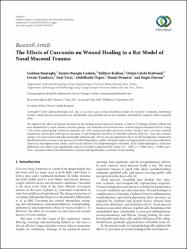The effects of curcumin on wound healing in a rat model of nasal mucosal trauma

View/
Access
info:eu-repo/semantics/openAccessDate
2017Author
Emiroğlu, GökhanCoşkun, Zerrin Özergin
Kalkan, Yıldıray
Erdivanlı, Özlem Çelebi
Tümkaya, Levent
Terzi, Suat
Özgür, Abdulkadir
Demirci, Münir
Dursun, Engin
Metadata
Show full item recordCitation
Emiroglu, G., Ozergin Coskun, Z., Kalkan, Y., Celebi Erdivanli, O., Tumkaya, L., Terzi, S., Özgür, A., Demirci, M., & Dursun, E. (2017). The Effects of Curcumin on Wound Healing in a Rat Model of Nasal Mucosal Trauma. Evidence-based complementary and alternative medicine : eCAM, 2017, 9452392. https://doi.org/10.1155/2017/9452392Abstract
We explored the effects of topical curcumin on the healing of nasal mucosal wounds. A total of 32 Sprague-Dawley Albino rats were randomized in equal numbers into four groups, and unilateral nasal wounds were created using an interdental brush. Group 1 (the sham-control group) contained untreated rats with traumatized right-side nasal cavities; Group 2 and 3 rats were similarly traumatized and treated with topical curcumin (5 and 10mg/mL) dissolved in dimethyl sulfoxide daily for 7 days after trauma; Group 4 rats were treated with topical dimethyl sulfoxide only. All rats were decapitated on day 15 and the healing sites evaluated by blinded observers in terms of the presence of cellular hyperplasia, goblet cell hypertrophy and degeneration, leucocytic infiltration, ciliary loss and degeneration, edema, and vascular dilation. on histopathological evaluation, all of cellular hyperplasia, leukocytic infiltration, and edema were significantly reduced in Group 3 compared with Group 1 (p = 0.001, p = 0.004, and p = 0.008, resp.). Thus, curcumin reduced the inflammatory response and significantly accelerated wound healing.

















